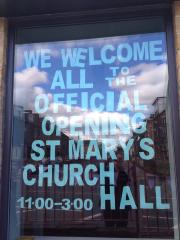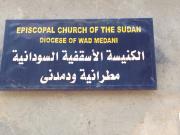The Diocese of Bradford is currently hosting the Bishop of Khartoum, Sudan, as we celebrate 30 years of a diocesan link. Talking with the bishop over the last few days about the situation facing Christians in Sudan, I keep asking myself the question why a red line has been drawn in Syria, but not in Darfur? President Bashir has been indicted by the International Criminal Court in The Hague, yet the West has not threatened to carry out surgical strikes against those Sudanese military installations that continue to commit murder on a massive scale.

Why not? What is the moral difference between Syria and Darfur/Sudan?
These questions arose not just from conversations with the Bishop of Khartoum, but also from a service in a Bradford parish church this morning.
Church – particularly the Church of England – frequently gets a bad press, yet where else can you find a community of people who consciously belong together, deliberately question their own way of life, dig deep into the stuff of their souls, wrestle with how personal commitment (discipleship of Jesus) connects with (or leads to or derives from) stuff like Syria, Darfur, and so on? Where else do you get this corporate soul-searching in a context of music, silence and attentive listening? What other group brings together (by choice) people of different social strata in one place where attention is paid to looking at the self and beyond the self, encouraging commitment and perseverance, challenging complacency and hypocrisy?
I think we easily overlook just how remarkable this phenomenon is. A congregation thinks of today's routines in the light of the eternal and the global. It hangs on and lives with uncertainty and unresolved questions. Yet, it does so with hope – not wishful thinking, but the hope that derives from “hearing amid the cacophanies of the present the music of the future”.

Anyway, the point I was musing on with the congregation this morning was that when Jesus invited people to follow him, he insisted that they did so with their eyes open. This journey would be no walk in the park, but would throw them together with people they wouldn't choose and might not like – but by following him they would deny themselves the option of choosing company that was convenient to them. Pulling together a passage from Jeremiah (18:1-11) and Luke (14:25-33), we noted that Christians are to be people who, having received the generosity of God, are bound to live generously. However, they must also live out the habit of recognising failure and choosing to change – personally and by feeding the hungry, caring for the destitute, and so on.
And when it seems that, in Jeremiah's language, the potter's clay gets messed up and has to be broken and re-thrown, this is not the end of the story. According to the biblical narrative, (and in the words of Amercian Fransiscan, Richard Rohr) “everything belongs”. Nothing of our life is wasted. The broken bits get collected up and re-worked into something both beautiful and useful. Yet, this should not be easily romanticised: it is painful and hard, and impacts on the emotions, the psyche, lifestyle and self-esteem.
This is what church does. It creates a space in which deep examination and questioning can go on – both of the self and of the world we live in. And it opens up the possibility of motivating a community of people who seek to see the world changed, but starting with themselves. This is the humility of repentance.
And it compels us not to lose hold on the hard questions about self and Syria, the local and the global, the temporal and the eternal.
It is also hugely enjoyable.

